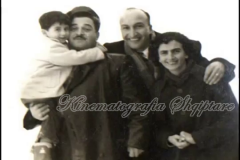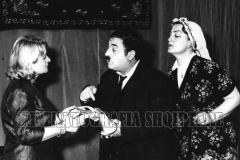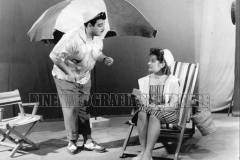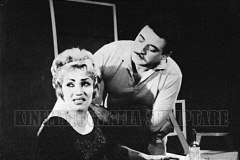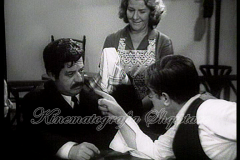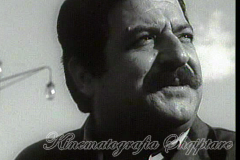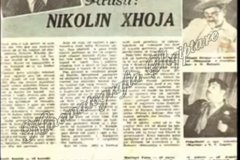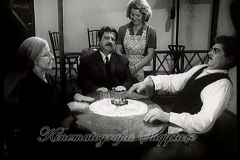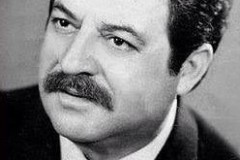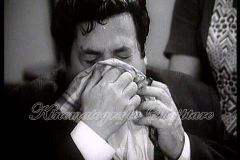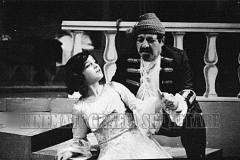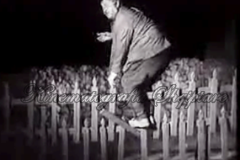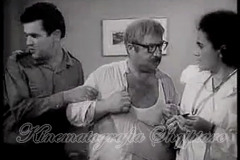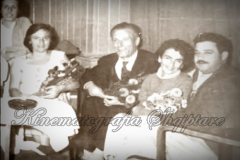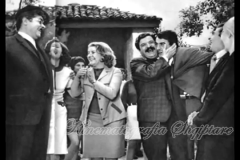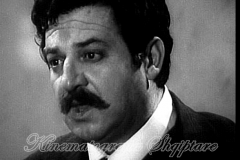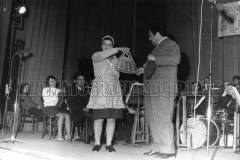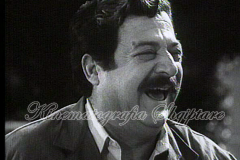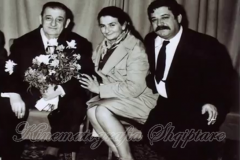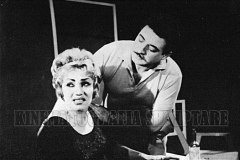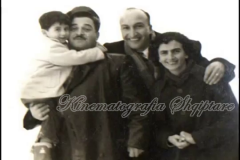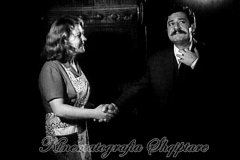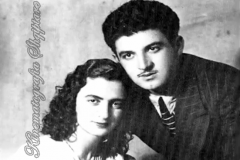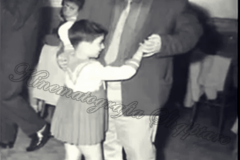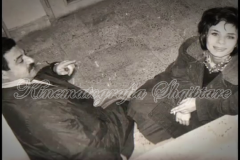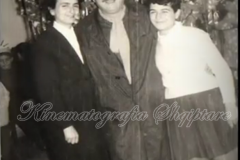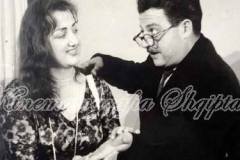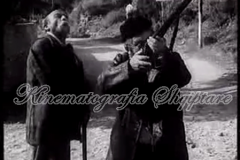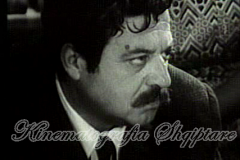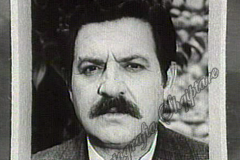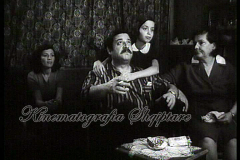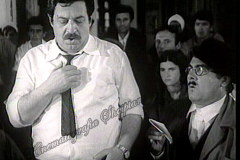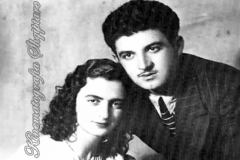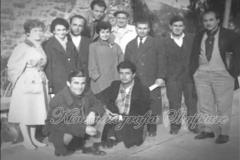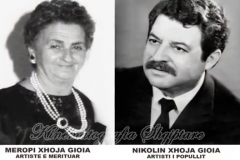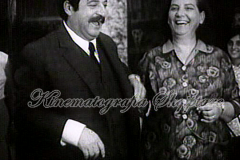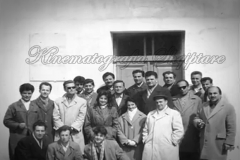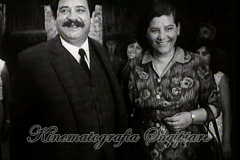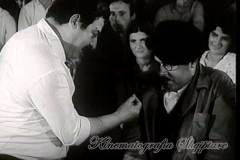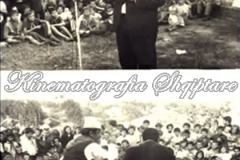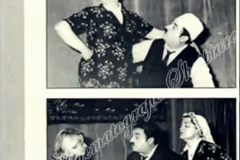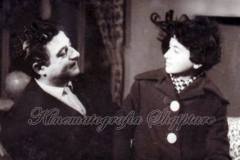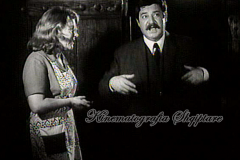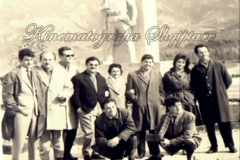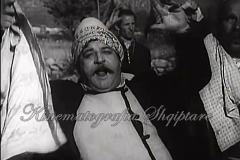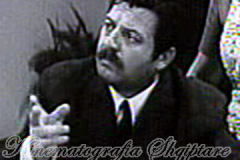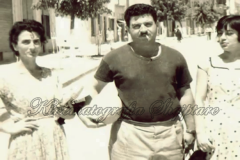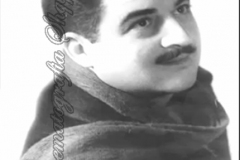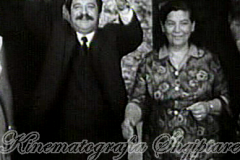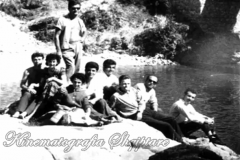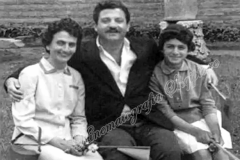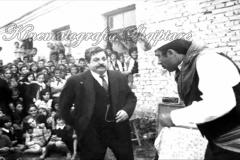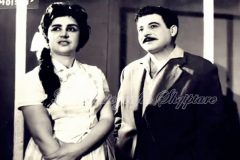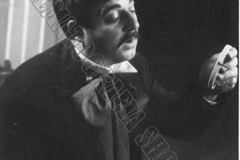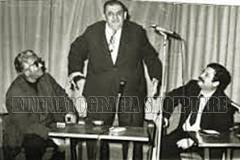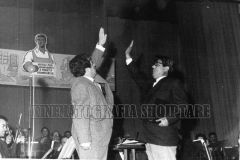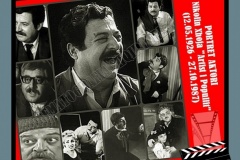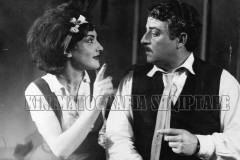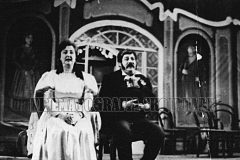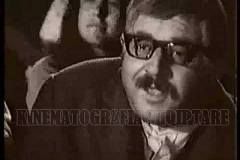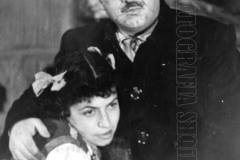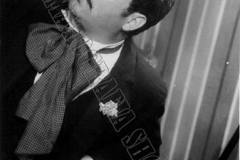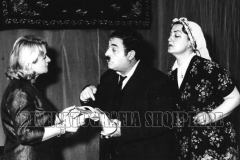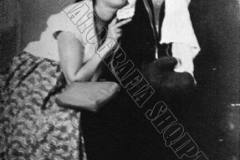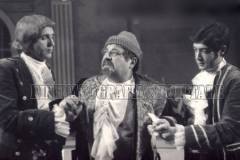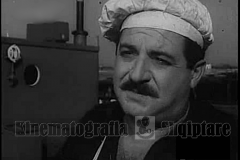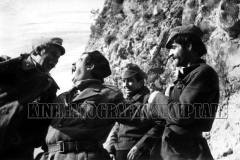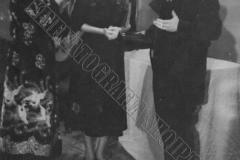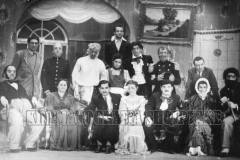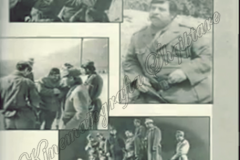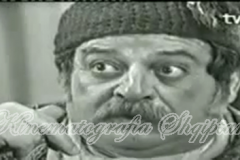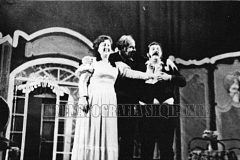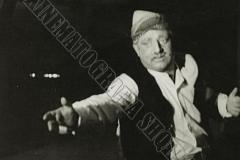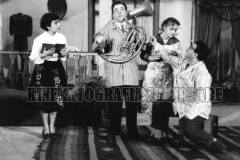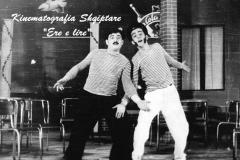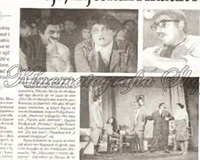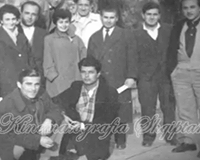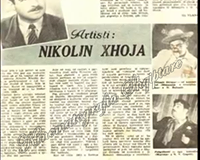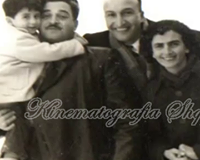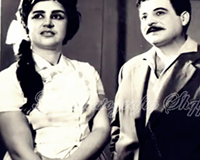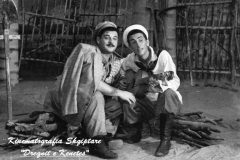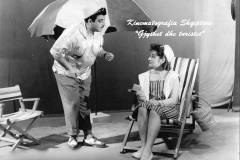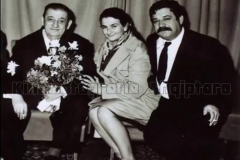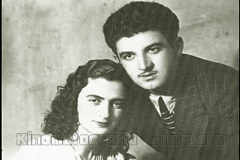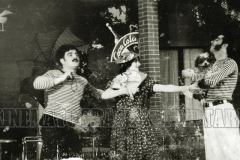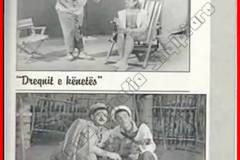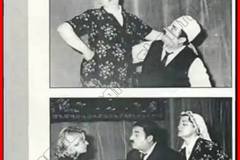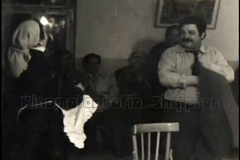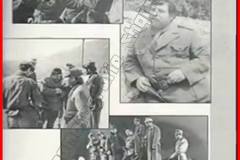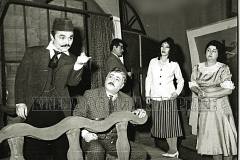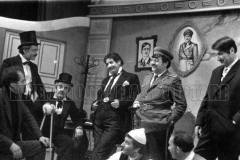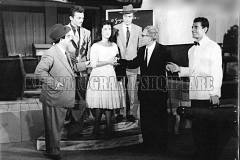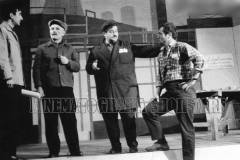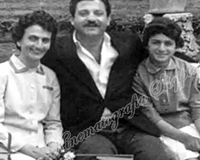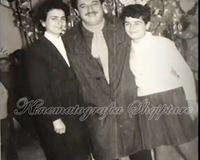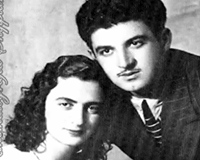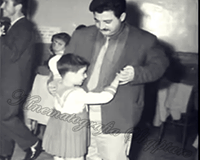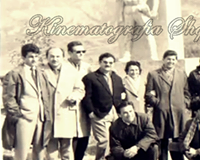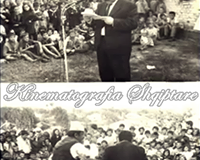Nikolin Xhoja (1926-1987)
One of the giants of the Albanian stage, both in theater and in cinematography! If there is a single theater actor in the Albanian Stage Art of yesterday, completely stripped of theatricality, original and organic in his interpretations, an actor where the simplicity of man unites at the same time authenticity, inner emotion and the greatness of art, – this actor it’s Nikolin Xhoja! That’s what Miho Gjini, “Great Master” said!
* * *
Nikolin Xhoja (Gioia) was Italian by father’s origin and Albanian by mother’s. He was born in Brindisi on May 12, 1926. When the actor was 6 years old, he moved with his mother to Albania, to stay here forever. Nikolin lived in Durrës, created and performed in the “Aleksandër Moisiu” Theater of this city, in the period of Italian Neo-Realism on the one hand and Socialist Realism on the other, choosing with intelligence and talent the “intermediate path”.
The range of his repertoire clearly stood out in the works of our authors Pitarka, Levonja, Gjata, Bubani, Buxheli, Vlashi and Laço, but it took full shine in the works of world luminaries Moliere, Gogol, Chekhov, Goldon and Ranet.

Actively participates in the ranks of the National Liberation Army, with the theater groups of combat units. In the partisan philodrama group in Kosovo, he is one of the main actors of the military unit, which has given many performances in the cities of Gjakova, Sanxhak, Mitrovica, Gostivar, Ohrid, with skits and short comedies such as “Uncle Ceni”, “Shoemaker”, “The partisans are coming” etc.
After liberating the country and returning to Durrës, he continued to play as an amateur actor near the central group of the House of Culture. He is one of the founding actors of the “Aleksandër Moisiu” theater in Durrës, on January 11, 1955. His first role as a professional actor was that of Kosta in the comedy “Girl from the Country” by Fatmir Gjata. He has played 54 roles in the theater, mainly comic and satirical, also in 11 premieres of the Durrës variety show as well as in 7 feature films.
One of his most notable achievements, widely known in Albanian acting, was the role of Qazim Mulleti in the comedy “The Prefect” (1968) by Besim Levonja. He embodied full of wit and subtle humorous means the face of the quisling, the coward, especially that of the corrupt official and the charlatan, thanks to an adaptation that made the two-faced behavior even more visible: the boasting and the panic, the honesty and the predatory nature, the rudeness and the soul supposedly from the father.
With this role, N. Xhoja’s performance reached one of the top values of Albanian acting, equivalent to the acting quality of Mihal Popi in this role. Then he continued with the role of Podgolisen in the comedy “Marriage” by Gogol, which remains in the background of the most realized figures of his career, played with comic truth and charm.
The gifts of the talented comic were fully displayed in the interpretation of the two main roles in the comedies of Spiro Comore, as Nikollaq Jorganxhiu in “Carnavals of Korça” (1996), who was impressed by elegance, finesse, comic charm, which came in a redeemed way, without screams and pretended nervousness; Aristotle in “Two – Zero” with the subtitle “Educating Parents” (1969), where he played full of charm with implications and misunderstandings, with two-way attitudes, fluctuations, returns , with immediate affirmations and denials, giving the image, little more than “positive”, a defensive position in the show.
Unlike many previous figures, with the role of Rrapo Tabani in the dramatization “Time of Commissioners”, based on the novel “Man with Cannon” by Dritero Agolli, he managed to create the image of a popular commander, somewhat harsh in appearance, gentle port, very human father in spirit. Here the comic elements and findings, which came from the way of behaving, the “popular” speech, the psychophysical adaptation, were also interwoven with the
epico-dramatic and heroic tones.
Although he was an actor with a tendency towards popular humor, he also performed successfully in some of Moliere’s comedies, where he felt sarcasm as well. He stood out especially in the comedy “The Imaginary Sick” (1983) with the role of Argan, through which he gracefully ridiculed the snobbery of the rich but unenlightened bourgeoisie, to be equal to the high ranks of the traditional French nobility in terms of knowledge, habits, tastes, culture and lifestyle.
N. Xhoja managed to make this character both funny and contemptible at the same time; necessarily more successful and closer to the first approach and a little to the second.

Another figure full of salty mood was that of uncle Beqo in the movie “The Captain” (1972). Here he sculpted with great skill and fine sense the kind-hearted, cheerful, handsome, somewhat portly, beloved and sweet man, creating together with the other actor, Albert Verria in the role of Sulo, one of the most harmonious acting duos , both from the point of view of building relationships, in a completely natural way, as well as from the point of view of sympathies, opposites and mutual complements in characters, in dialogues and in their spiritual states.
He then played the role of the Progressive in the film “The Happy Couple” (1975). Even though he was a “positive character”, where the decoration was felt, on the contrary, with his brilliant acting, he managed to infuse the figure with life, organic expression and gestures, as well as a comical light, avoiding the schematic conceptions they possessed at that time. With a few brushstrokes, N. Xhoja gave his own physiognomy even to small roles, as was clearly seen with the role of the cook in the film “Open Horizons” (1968) etc.
His play was warm, free, saturated with many details and findings, merging in a comprehensive way with the character and approaching his comic situations with full truth.
N. Xhoja was one of the most organic and true Albanian actors in stage action and character experience, both on stage and on movie screen. His behavior on stage or in front of the camera was almost “natural”, which testified to his original talent, the ability of psychophysical behavior, redemption and mastery of the situation. There was grace and cuteness. With his fine art and tastes as an actor, he portrayed a gallery of characters, mostly figures of fatherly people, simple, somewhat naive and naive, white-hearted or cowardly, gentle and good, selected from various social backgrounds, historical or national ones.
He passed away on October 27, 1987.
Other roles in the Theater : Antique dealer “Antique dealer”; Uncle Aliu “People on the Rock”; The Dealer in “Detours” by Q. Buxhelit, etc.
Filmography:
Open horizons – (1968)… Cook;
Captain – (1972)… Uncle Beqo;
Spring Trip – (1975)… Warehouseman;
The Happy Couple – (1975)… Daughter’s Father;
The Call – (1976)… Baca Leka;
On the brink of Life – (1981)
It was published for the first time on the Albanian Cinematography – Facebook page in May 2014 and was revised several times in the following years.
________________
Albanian Cinematography in activity since 2013
Reference: “Albanian Encyclopedia, Theater and Cinematography” – Toena 2009 / Papagjoni. J / p. 548-549 / Higher Institute of Arts, History of Albanian Theater 3 (1984) p. 137-139 / J. Papagjoni / As well as various news from Albanian portals and online newspapers.
Follow us: Blog: https://albaniancinematography.blogspot.com/ Vimeo: Albanian Cinematography (vimeo.com) Facebook: https://www.facebook.com/ksh.faqjazyrtare Dailymotion: https://www.dailymotion.com/kinetografiashqiptareartisporti YouTube: https://www.youtube.com/channel/UCDRYQ5xCyGkfELm3mX8Rhtw
Discover more from Albanian Cinematography - Sport
Subscribe to get the latest posts sent to your email.

